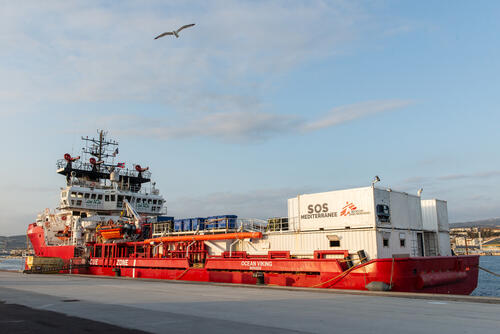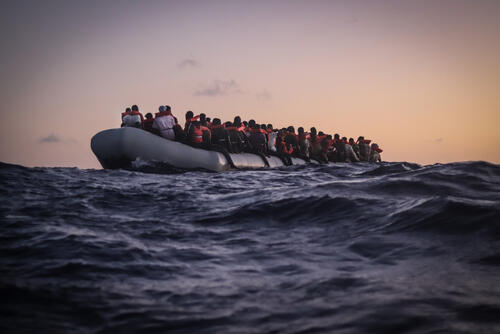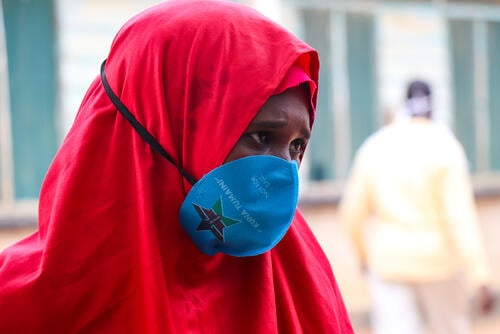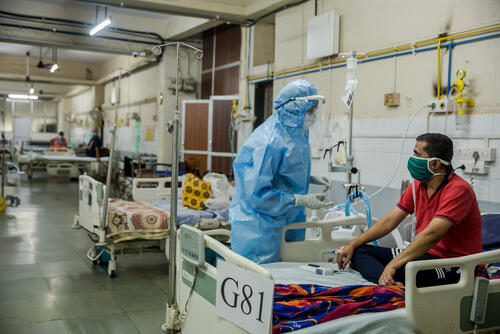- European governments are using the COVID-19 pandemic as an excuse to shirk responsibilities to those trying to cross the Mediterranean, thwarting NGO search and rescue (SAR) efforts.
- Meanwhile, shelling continues in Tripoli, and people continue to flee Libya with deadly consequences.
- The actions of EU states have created hostility for NGO SAR operations, with countries shutting their ports, leaving few assurances of a place of safety for disembarking rescued people.
- As a result of a disagreement between MSF and partner SOS MEDITERRANEE on whether to continue operations in the SAR ship Ocean Viking, MSF has ended the partnership.
- MSF now urges EU states to take responsibility for the humanitarian crisis at sea they have fostered and reinstate EU search and rescue capacity.
Amsterdam – European governments must stop using the COVID-19 pandemic as an opportunity to enforce deadly migration control policies and must immediately lift the obstacles preventing NGOs from saving lives at sea, says Médecins Sans Frontières (MSF) in an urgent call today.
The plea follows grotesque scenes that played out in the Mediterreanean Sea over the Easter weekend. Citing COVID-19 as justification for not assisting, Malta and Italy failed to respond to multiple overloaded dinghies in distress in their search and rescue regions, and declined a place of safety for disembarkation to nearly 200 people rescued by two non-governmental organisation (NGO) shipsOver the Easter weekend one boat arrived autonomously to Porto Palo in Sicily, while another with approximately 47 people on board issued multiple distress calls while in Maltese waters. It received no assistance for over 40 hours from the Maltese Armed Forces and was ultimately rescued by Salvamento Maritìmo Humanitario’s vessel Aita Mari, which diverted its course while in transit to provide life-saving assistance. Another boat, with approximately 55 people on board, remained stranded in the Maltese search and rescue region and ultimately was picked up by a commercial ship in Maltese waters, with five dead and seven others reported missing. The survivors were eventually returned to Tripoli by a Libyan vessel, but they could not disembark for several hours because of continued insecurity in the area of the port..
European aerial assets meanwhile surveilled from above, watching as the situation deteriorated over a period of days, but not taking action. At least five people have now been confirmed dead and seven are missing as a direct result. Meanwhile, contact with a boat carrying approximately 85 people was lost on 12 April and despite claims by the European Border Agency FRONTEX that it arrived in Sicily, it is feared to have capsized.
The call by Germany for NGOs to cease search and rescue activities, and decisions by Italy and Malta to close their ports to rescued people, are discriminatory and disproportionate.Annemarie Loof, MSF operations manager
“As an emergency medical humanitarian organisation responding to the pandemic in Europe and beyond, MSF understands the serious challenges presented by COVID-19,” said MSF Operations Manager, Annemarie Loof. “But safeguarding the wellbeing of those on land and upholding the duty to save lives at sea are not mutually exclusive principles.”
“The call by Germany for NGOs to cease search and rescue activities, and decisions by Italy and Malta to close their ports to rescued people, are discriminatory and disproportionate,” continues Loof. “At best, these are ill-informed and knee-jerk reactions; at worst, this is calculated and cyncial leveraging of public health concerns to prohibit lifesaving operations, shutting the door to those in desperate need of protection.”
“MSF is concerned that states are instrumentalising outbreak control measures to justify the violation of international law and humanitarian principles, leaving the most vulnerable to die at Europe’s borders,” says Loof.
With resettlement, relocation and repatriation mechanisms suspended, there are currently no alternatives for refugees and migrants trying to escape Libya, a country that has been embroiled in conflict for the last year. According to the International Organization for Migration (IOM), at least 650,000 refugees and migrants are now stranded in the country, and 150,000 Libyans have additionally been displaced.
Over the past week alone, more than 700 people attempted to flee in flimsy wooden and rubber boats – their only means of escape from the unfolding humanitarian disaster. Additionally, disembarkations of refugees and migrants intercepted at sea, and forcibly returned by the Libyan coastguard, have been delayed twice in the past week because of shelling around ports in Tripoli.
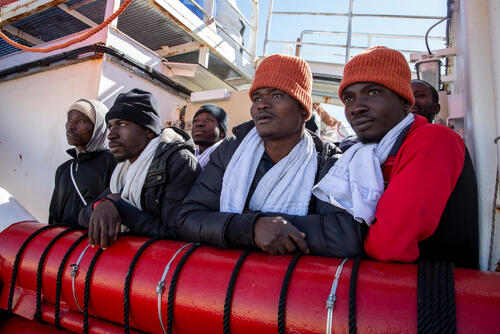
End of the partnership between MSF and SOS MEDITERRANEE
Despite the undeniable need for dedicated search and rescue efforts, European states continue to abdicate their responsibilities, relentlessly thwarting NGO efforts. The result is a context of hostility and uncertainty, paralysing the efforts of those endeavouring to fill the gap in lifesaving capacity left by governments.
Despite having a ship and medical, humanitarian and rescue teams ready to return to sea, barriers to humanitarian action in the Mediterranean have been further compounded by the current pandemic, rendering MSF and its partner SOS MEDTERRANEE unable to agree on sailing at this time and undermining the viability of the partnership.
Despite recognising that governments’ attempts to exacerbate existing barriers to our mission was a real dilemma, MSF has taken the very difficult decision to end our partnership with SOS MEDITERRANEE.Annemarie Loof, MSF operations manager
“Although both MSF and SOS MEDITERRANEE agree on the vital need for our lifesaving work at sea, SOS MEDITERRANEE felt further assurance from states regarding a place of safety was necessary before sailing,” says Loof. “For MSF, the humanitarian imperative to act was immediate, with or without such assurances: we could not stand by with a fully equipped search and rescue ship in port as people continue to flee Libya and risk drowning.”
“As such, and despite recognising that governments’ attempts to exacerbate existing barriers to our mission was a real dilemma, MSF has taken the very difficult decision to end our partnership with SOS MEDITERRANEE,” explained Loof.
European states – having reduced NGO search and rescue capacity and placed extreme constraints on those few left – must now, finally, take responsibility for the humanitarian crisis at sea they have fostered. This means stopping further loss of life and suffering by reinstating EU search and rescue capacity and ending funding and support to the Libyan coastguard to forcibly return people to Libya.
MSF has worked in partnership with SOS MEDITERRANEE since 2016, together they have rescued and assisted more than 30,000 people with two search and rescue vessels, Aquarius and Ocean Viking.
MSF continues to work in Libya, providing humanitarian and medical assistance to migrant and refugee populations stranded in the country, both inside official detention centres and within the community. The organisation is also currently responding to the new coronavirus pandemic across Europe, the Middle East, Africa, Asia and the Americas, including in many countries with weak health systems and highly vulnerable people, including migrants and refugees living in overcrowded conditions in detention centres or camps, without adequate water or sanitation and limited access to health care.



